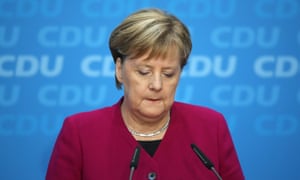Merkel's long goodbye will be severe test for troubled continent
Europe’s political stability is at greater risk than at any time since second world war
When Angela Merkel first came into office in 2005, George W Bush was in the White House, Tony Blair was British prime minister, and the Elysée Palace was occupied by Jacques Chirac.
The German chancellor’s announcement on Monday that she would not seek re-election as head of her ruling centre-right CDU party and that her fourth term as chancellor would be her last, heralds the end of an era in which she has dominated German and European politics.
Merkel has been a symbol of steadiness and continuity. The departure of the EU’s de facto leader before Germany’s next federal elections – due in 2021 – comes as the continent’s political stability and consensus are arguably at greater risk than at any time since the end of the second world war.
Merkel’s decision follows a succession of poor election results that began with last year’s federal vote, when the CDU slumped to its worst return since 1949. Regional polls in Bavaria and – this weekend – in Hesse, where the party plunged 11 points to 27%, weakened her further.
After months of fraught negotiations, Merkel’s damaged conservatives renewed a weakened and unpopular coalition with their traditional centre-left rivals, the Social Democratic party (SPD). In an ever more fragmented European political landscape, both are now paying the price as voters turn their backs on the traditional parties of government
Held together more by a fear of the alternative – and, in particular, the further rise of the far-right AfD – than by any driving policy ambitions, the governing alliance in Berlin lacks clear, bold ideas and the courage to implement them, creating an increasingly untenable leadership vacuum that voters have punished.
Merkel’s move was not, then, entirely unexpected. She has decided that governing one hard-fought compromise at a time, clinging on after elections that were defeats but not quite disasters, is doing more harm than good – and it would be better to remove herself from the electoral equation.
But the loss of a chancellor whose cautious blend of principle and pragmatism guided her country and the EU through the 2008 financial crash and ensuing eurozone crisis, the Arab spring, Russia’s aggression in Ukraine and Europe’s migration crisis will still leave a chasm to be filled.
While applauded for its humanity, many see her bold decision in 2015 to open Germany’s borders to about a million refugees, mostly Muslims fleeing wars and poverty in the Middle East and beyond, as having speeded her departure, diminishing her authority, dividing her party, her country and its European partners, and boosting support for anti-immigrant parties.
At home, all eyes will will be focused on whether Merkel can manage to stage a smooth exit. In theory, her announcement that she will not be standing again for the party’s leadership at its conference in December should – while she remains chancellor – allow a new CDU chair to build a strong electoral profile before 2021.
But events may well intervene. Merkel is under heavy pressure from her ailing SPD partners to deliver more policy results. The centre-left party, whose vote share has plummeted to an all-time low, could yet pull out of the coalition government during a midterm review next year.
That would trigger federal elections and an earlier-than-planned departure for Germany’s first female chancellor. Two of her CDU predecessors as head of government, Konrad Adenauer and Helmut Kohl, both failed signally to ensure an untroubled succession.
Even if Merkel avoids a messy end to her political career, the CDU’s attention will necessarily be on putting its own house in order and finding a successor able and willing to step into Merkel’s shoes. The government, likewise, will be seeking domestic progress faced with the advances not just of the AfD, but the pro-EU, refugee-welcoming Greens.
The chancellor’s weakness at home could well limit her capacity to lead – or at least, provide stability – in the EU at a time when the bloc is dealing with Brexit, a budget crisis in Italy and the prospect of populist parties making big gains in the European parliament elections next May.
This is bad news mainly for the French president, Emmanuel Macron, whose big visions of eurozone reform now look further from being realised than ever. It will not, however, herald any major changes in Germany’s policy towards the bloc – or to Brexit.
Senior UK officials and politicians had long predicted Merkel would step in close to the end of Brexit talks to secure a deal that Theresa May could sell to parliament. That was never very likely – but even if it had been, with her leadership now time-limited, Merkel’s leverage to fix results has been hugely weakened.
More significantly, EU diplomats note that neither Merkel nor Macron can afford to offer the UK any succour in the negotiations.
With European elections due next May, the onus for the powerful Franco-German alliance will be on maintaining a tough, principled approach that illustrates clearly the benefits of EU membership and the grave risks to an economy of leaving.

No comments:
Post a Comment